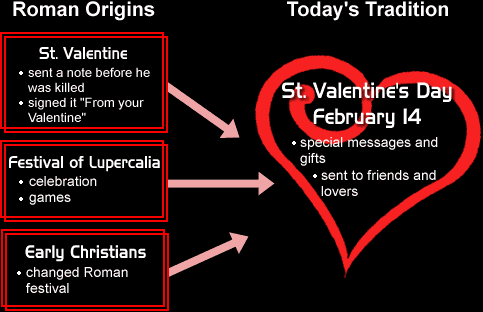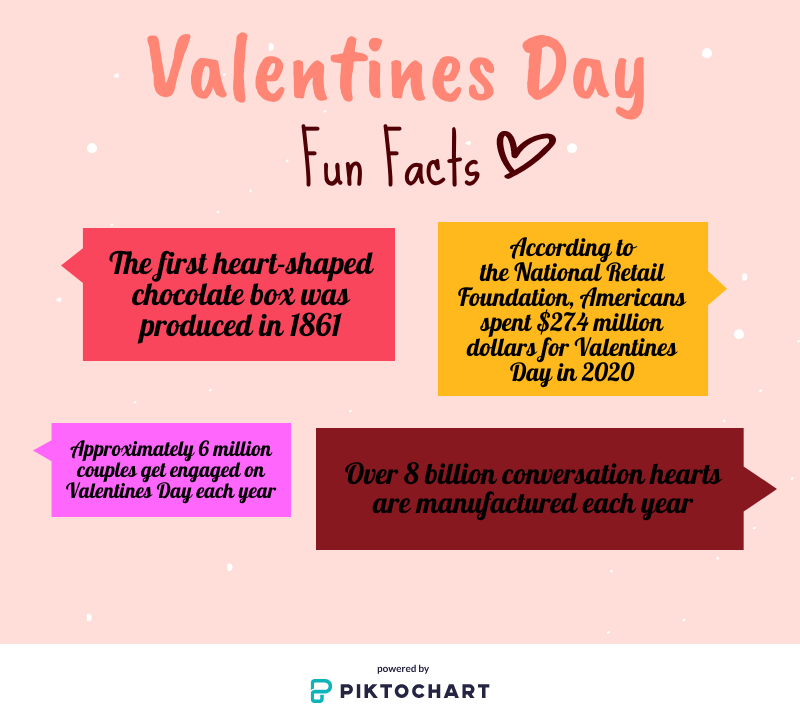Gallery
Photos from events, contest for the best costume, videos from master classes.
 |  |
 |  |
 |  |
 |  |
 |  |
 |  |
Valentine's Day is a time to celebrate romance and love and kissy-face fealty. But the origins of this festival of candy and cupids are actually dark, bloody — and a bit muddled. Valentine’s Day, holiday (February 14) when lovers express their affection with greetings and gifts. It may have had beginnings in the Roman festival of Lupercalia, which celebrated the coming of spring and included fertility rites and other activities, but the origin of the holiday is vague at best. Valentine's Day, also called Saint Valentine's Day or the Feast of Saint Valentine, [1] is celebrated annually on February 14. [2] It originated as a Christian feast day honoring a martyr named Valentine , and through later folk traditions it has also become a significant cultural, religious and commercial celebration of romance and love in What are the historical origins and meaning of Valentine's Day? Get the facts. Updated: January 6, 2025 | Original: December 22, 2009. copy page link Print Page. Ian Gavan/Getty Images for ASDA. While the commercialization of Valentine’s Day has been criticized for overshadowing the holiday’s original meaning, it has also made it more accessible to a wider audience. The proliferation of Valentine’s Day cards, gifts, and merchandise allows people from different cultures and backgrounds to participate in the celebration of love. Why do we celebrate Valentine's Day today? Valentine's Day's transformation into a holiday about romantic love can be attributed to the Romantic English poet Geoffrey Chaucer. The Times notes that Jack B. Oruch, a late University of Kansas English professor, credits Chaucer for modern ideas about Valentine's Day. Through his research, Oruch The first written connection between love and Valentine’s Day appears in his poem, Parlement of Foules, written in the late 14th century. Chaucer appears to have invented the correlation that Valentine’s Day equals love and chalked it up to poetic license. The history of Valentine’s Day is a bit blurry, but it’s also possible that he Valentine's Day always falls on February 14, meaning that the day of the week varies year on year. In 2025, Valentine's Day will fall on a Friday for the first time since 2020. Where did it come Where does the name Valentine come from?. The holiday is aptly named after Saint Valentine, but who exactly was he? Valentine is likely based on a combination of two Valentines who were executed on February 14 in different years by Roman Emperor Claudius II in the 3rd century A.C.E., according to NPR. Valentine’s Day is a romantic holiday celebrated each year on February 14. Learn about St. Valentine, Valentine's Day quotes and the ancient origins of Valentine's Day. The first written connection between love and Valentine’s Day appears in his poem, Parlement of Foules, written in the late 14th century. Chaucer appears to have invented the correlation that Valentine’s Day equals love and chalked it up to poetic license. The history of Valentine’s Day is a bit blurry, but it’s also possible that he On Feb. 14, sweethearts of all ages will exchange cards, flowers, candy, and more lavish gifts in the name of St. Valentine. But as a historian of Christianity, I can tell you that at the root of Valentine's Day has quite the history. Learn about why we celebrate Valentine's Day, the meaning of the holiday, when Valentine's Day is this year, why Valentine's Day is on February 14, and more. Discover the essence of Valentine's Day: delve into its true meaning, explore its rich history and origins. By: History.com Editors Updated: February 14, 2024 | Original: October 27, 2009 Lupercalia was an ancient pagan festival held each year in Rome on February 15. Although Valentine’s Day shares its name with a martyred Christian saint, some historians believe the holiday is Clarksville, TN – February 14th, Valentine’s Day is a day dedicated to expressing love and affection through cards, flowers, chocolates, and heartfelt gestures. While modern Valentine’s Day The origin of Valentine's Day might surprise you – here's what to know From a Roman festival to Christian martyrs to a medieval celebration of spring, we explore the origins By Taysha Murtaugh and Terri Robertson Published: 30 January 2025 The earliest possible origin story of Valentine’s Day is the pagan holiday Lupercalia. Occurring for centuries in the middle of February, the holiday celebrates fertility. The Valentine's Day icon began as a handsome young man in Greek mythology. The original Cupid was more of a heartthrob than a cherub. Traced back to 700 BC, this character of legend was called The history of Valentine’s Day actually finds its roots in ancient Rome and Victorian England, and it’s not as rosy as you might want to believe. St. Valentine actually refers to several people.
Articles and news, personal stories, interviews with experts.
Photos from events, contest for the best costume, videos from master classes.
 |  |
 |  |
 |  |
 |  |
 |  |
 |  |